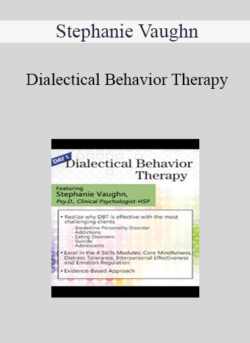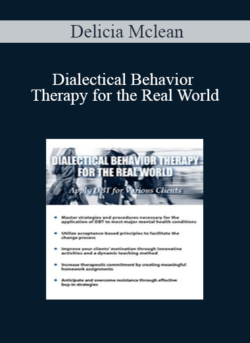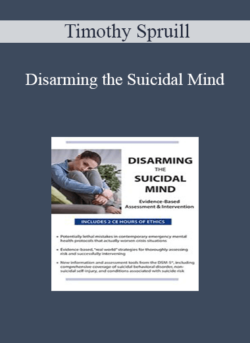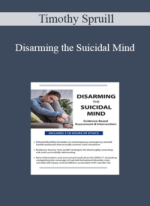[Instant Download] – Immediately deliver the download link after receiving the paymentPurchase Timothy Spruill – Disarming the Suicidal Mind: Evidence-Based Assessment and Intervention courses at here with PRICE $219.99 $41Faculty:Timothy SpruillDuration:6 Hours 21 MinutesFormat:Audio and VideoCopyright:Aug 27, 2018 Manual – Disarming the Suicidal Mind (8.41 MB) 56 Pages Available after Purchase Outline INTRODUCTION TO THE GROWING PROBLEM OF SUICIDE IN AMERICANeed for concern: statistics revealing the increasing trend in suicidal ideation, attempts, deathsNational dataState-specific dataCareer risks for the professional counselorFactors contributing to the failure of adequate assessment and triageInadequate training of physicians and professional counselorsInadequate funding for mental health (despite numerous parity laws)Shifting of the burden of assessment to emergency roomsPoorly trained law enforcement officers initiating involuntary admissionsEPIDEMIOLOGY — CONTRIBUTING FACTORSRisk factorsDemographic risk factors (age, gender, ethnicity, etc.)Environmental risk factors (adverse childhood experiences)AddictionsMental illnessEconomic risk factors (employment)Warning signsFeeling alone—isolated from family/friendsFeeling like a “burden” to othersLittle or no fear of deathRed herringsSuicide notesContingent suicide threatsCuttingPending divorceLimitations of the research and potential risksASSESSMENTS/MEASURES TO AID IN DETERMINING RISK LEVEL — A COMPREHENSIVE STRATEGYMental status examCollateral informationAdultsRelative lethality of plans/attempt (Risk/Rescue Scale)Hopelessness (Beck Hopelessness Inventory)Reasons for living (Brief Reasons for Living Scale)Adverse childhood experiences (A.C.E. Questionnaire)Teens and childrenPredictive/protective factors identified in the researchSpecial populationsVeteransLGBTPromising, novel methods for assessing riskImplicit cognitions—measuring implicit associations with death and suicideCOMMON INTERVENTIONS, MISTAKES, THINKING ERRORS & ETHICAL ISSUESOur natural tendencies to errFeelings of “rightness” are not reliable indicatorsExternal factors contributing to errorsInternal factors contributing to errorsSelf-care is criticalTwo types of thinking (fast and slow)Dangers of lazy, “fast” associative thinkingSubstitution of easy-to-answer question for more difficult and complex questionType 1 vs. Type 2 errors (legal liability and ethical issues)Patient autonomy and self-determinationConfidentiality limitsINTERVENTIONS AND TREATMENT PLANNINGNon-judgmental, empathic listeningAcknowledging reason for concernTaking advantage of ambivalenceEvidence-based interventions to reduce subsequent suicide attemptsDSM-5® new definitions and terminologyAssess suicidal ideation at the start of every visitDSM-5 level one screening questionnaireSuicidal Behavior DisorderNon-Suicidal Self-injuryCHALLENGES TO ACHIEVING SUCCESSFUL TREATMENT OUTCOMESMeans restrictionSocial support — supervisionFollow-up counselingExploring alternative responses should suicidal thoughts increase in frequency/intensityWHEN LOSING A PATIENT TO SUICIDE — REMAINING RESILIENT AND MOVING FORWARD FacultyTimothy Spruill, MA, EdD Related seminars and products: 1 Timothy Spruill, MA, EdD, has conducted more than 3,500 emergency psychiatric assessments in one of Orlando’s busiest emergency departments as a consultant at Advent Health, where he is a founding faculty member of the emergency medicine residency program. Through his work with high-risk patients and his research in the area of suicidology, Dr. Spruill has developed an evidence-based approach to emergency mental health that urges progress far beyond the fragile gains of traditional (and contemporary) psychological triage.His extensive experience conducting assessments and evaluations reaches back to his work in private psychiatric hospitals in the early 1980s. Dr. Spruill earned his Master’s degree in counseling psychology from George Mason University in 1977. After four years of teaching, he left for the applied world of a community psychiatric setting and pursued his Doctorate in counseling psychology at Western Michigan University. In addition to his ongoing consulting work, he returned to academia in 1991 to share his experience and extend his research capabilities. During his time with Andrews University and, subsequently, Advent Health, he has continued to collect data on suicide and conduct research in his chosen field of behavioral medicine. Since 2010, he has taught continuing education courses on the topics of suicide assessment, preventing medical errors, and violence. He has also presented his findings at numerous conferences, traveling as far as Cape Town, South Africa, to speak on suicide. Speaker Disclosures:Financial: Timothy Spruill is assistant director of Behavioral Medicine, Family Medicine and Emergency Medicine at Florida Hospital. He receives a speaking honorarium from PESI, Inc. Non-financial: Timothy Spruill has no relevant non-financial relationships to disclose. Salepage: https://catalog.pesi.com//item/disarming-suicidal-mind-evidencebased-assessment-intervention-33902Archive: https://archive.ph/wip/bYo5TPurchase Timothy Spruill – Disarming the Suicidal Mind: Evidence-Based Assessment and Intervention courses at here with PRICE $219.99 $41
 Stephanie Vaughn – Dialectical Behavior Therapy: For Clients
₹6,806.00
Stephanie Vaughn – Dialectical Behavior Therapy: For Clients
₹6,806.00
 Delicia Mclean – Dialectical Behavior Therapy for the Real World: Apply DBT for Various Clients
₹6,806.00
Delicia Mclean – Dialectical Behavior Therapy for the Real World: Apply DBT for Various Clients
₹6,806.00
Timothy Spruill – Disarming the Suicidal Mind: Evidence-Based Assessment and Intervention
₹6,806.00





